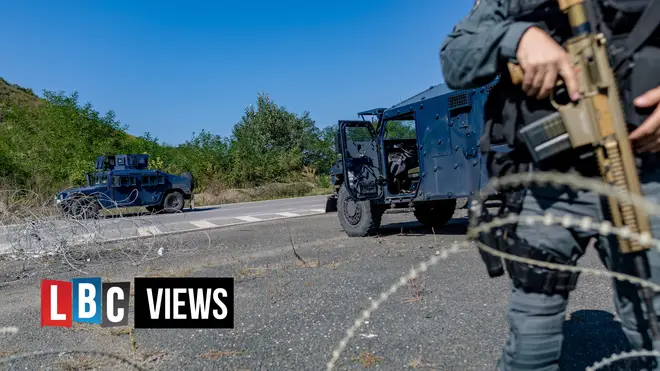
Oli Dugmore 4am - 7am
4 October 2023, 11:30

The end of September saw one of the worst escalations between Kosovo and Serbia since Kosovo’s unilateral declaration of independence in 2008. Early in the morning on the 24th of September, one Kosovo Police officer was shot dead, and during the day, 3 Serb gunmen were killed after they sieged the monastery of Banjska in the north of Kosovo.
In the coming days, the Kosovo government accused Belgrade of orchestrating this attack. To this day, Belgrade continues to deny this and maintains that it was not involved in any form or capacity in the latest round of escalation.
What is clear is we are unlikely to see a resolution to the fraught relations anytime soon.
In the days after the attack, many feared that Kosovo might become another war zone in Europe and that Serbia could engage in a Russia-style invasion of Kosovo. Driving these fears are several factors, most prominent among them the alleged buildup of Serbian troops near the Kosovo border, which the Serbian president denied in the CNN interview.
But, more broadly, the strong ties between Belgrade and Moscow and the deteriorating support for EU membership in Serbia is breeding across the region.
In particular, according to the polling and research conducted by The Henry Jackson Society, 78.7% of Serbs are against introducing sanctions against Russia. For the first time, more citizens of Serbia are against joining the EU than in favour.
Finally, when asked about NATO membership, 63.4% of Serbs said they would vote against joining. These figures, combined with strong pro-Russian propaganda - disseminated via Russia Today and Sputnik - fuel the fears that Serbia could similarly invade Kosovo as Russia.
While concerning that pro-Russian sentiments are thriving, the chances of Serbia invading Kosovo remain incredibly low for several reasons. First, the presence of Kosovo Force (KFOR) – NATO peacekeeping troops - in Kosovo means that neither Serbia nor Kosovo can escalate the situation extensively without de facto entering a war with NATO.
Second, even if either Kosovo or Serbia decided to escalate the situation substantially, KFOR could respond quickly and swiftly and prevent any escalation from turning into an all-out war.
Third, the Serbian government supports more KFOR troops in the north of Kosovo and would welcome KFOR becoming the key security force in the north of Kosovo. And, finally, in the last few rounds of EU-mediated talks between Belgrade and Pristina, Serbia has shown its commitment to normalisation of relations with the government remaining unequivocally committed to a peaceful resolution of relations.
De-escalation remains crucial, not just for the stability of the region but for the well-being of people who live in the north of Kosovo. Moreover, to normalise relations fully, getting Belgrade and Pristina back to the negotiating table and forcing the sides to follow through on their commitments. To do so effectively, the EU must improve its positioning in Serbia and push the country away from Russia.
And for that to happen, the EU needs to start speaking directly to the Serbian citizens and offer them more carrots and less stick. Otherwise, it allows the local governments to portray the EU negatively whenever that advances their personal or political aims, which would only further deteriorate relations between Serbia and the EU and decrease the EU's leverage over the country.